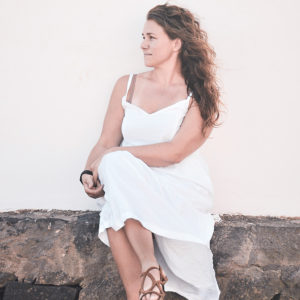Hard water can do some really weird things to your hair! The minerals in the hard water start to build up and leave behind a waxy film. And, the last thing you want to worry about while traveling (or just living your regular routine at home for that matter) is your hair looking gross. Thankfully, I have super simple, DIY tips for hard water haircare that’ll have you back to paying attention to more important things whether you are traveling or at home.
*Disclosure: Some of the links below are affiliate links. This means that, at zero cost to you, I will earn an affiliate commission if you click through the link and finalize a purchase.
There are a few simple tools you will need to get this done:
- *A shower cap or a shower head that you can manuver around well enough to not get your hair wet,
- *One of those old school ketchup and mustard bottles or anything with a finer tip so you can target the liquid coming out,
- *Bottled spring or distilled water (best to have too much than not enough, I use about a liter sized bottle to rinse my medium/long sort of thick hair once plus what ever I need to mix my conditioner and fill the spray bottle),
- *Apple Cider or White vinegar (only if you already have hard water build up in your hair).
- *Spray Bottle

Step 1:
Add some bottled water to the spray bottle and begin to spray your hair. It doesn’t need to be sopping wet but this will just make the following steps more efficient.
Step 2 (Only if you already have hard water build up in your hair):
Mix anywhere between a teaspoon and a tablespoon of vinegar into 1 to 2 cups of water into the ketchup bottle. Begin at the scalp and work your way down to the tips, coating the hair with the mixture, give your scalp a good quick massage and then rinse with bottled water. It’s just a rinse, so it doesn’t need to stay in long. Then rinse out the ketchup bottle.
Step 3:
Mix your shampoo or conditioner (I only use conditioner for something that’s called co-washing and has been a game-changer for my hair). Whatever your normal amount of product, add that to 1 to 2 cups of water. Don’t worry about the precision so much here, you’ll figure out what works best for you after trying it once or twice and a little more or less water isn’t going to make a huge difference.
Again, start at the scalp and work down to the tips.
By the way, this is a great way to save time and money on your shampoo and conditioner even if you don’t have hard water, especially if you use more expensive products. Most soaps and shampoos and conditioners are super concentrated and, particularly if you have thicker hair, you waste so much of it trying to get down to the roots.
And then rinse again.
These DIY tips for hard water haircare work for more than just hard water!
The Shower Cap
This is to keep the hard water from ever touching your hair!
It may seem wasteful to use bottled water for washing your hair but there is probably so much waste if you have to wash your hair constantly. Not to mention all the products you’d go through to try and correct the problems.
And with all my other tips and tricks for hair care, I only wash my hair once a week anyway.
The Spray Bottle
This is also great to have around after you’ve slept on your hair and it’s doing something weird in the back. I use it after I brush my hair with the boar bristle brush and it gets a little frizzy. And also, before I get in the ocean or pool. Saturating your hair with fresh water beforehand protects the hairshaft from absorbing the more drying elements.
Do you have a hard time taking care of your beautiful curls? Check out:

